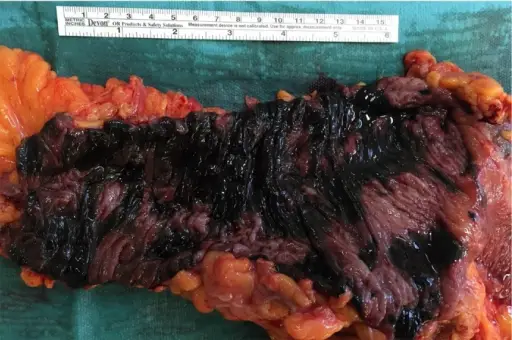Ischemic bowel disease is a lack of blood flow to the bowel temporarily, usually due to constriction of the blood vessels supplying the colon or lower flow of blood through the vessels due to low pressures.
What is the Pathology of Ischemic Bowel Disease?
The pathology of ischemic bowel disease is:
-Etiology: The cause of ischemic bowel disease is blockage in an artery caused by a blood clot, or a narrowing of an artery due to buildup of deposits, such as cholesterol.
-Genes involved: NOD2/CARD15, TNFSF15, ATG16L1, IL23R, and IRGM.
-Pathogenesis: The sequence of events that lead to ischemic bowel disease are: heterogeneous group of disorders caused by acute or chronic processes, arising from occlusive or nonocclusive etiologies, which result in decreased blood flow to the gastrointestinal tract. The clinical course may range from transient and reversible to fulminant.
-Histology: The histology associated with ischemic bowel disease shows bowel wall thickening.
How does Ischemic Bowel Disease Present?
Patients with ischemic bowel disease typically women of older ages older than 60 years. The symptoms, features, and clinical findings associated with ischemic bowel disease include: Abdominal cramps or fullness, abdominal pain, bloating, weight loss, diarrhea, nausea.
How is Ischemic Bowel Disease Diagnosed?
Ischemic bowel disease is diagnosed by Colonoscopy, blood tests, X-ray, ultrasound, CT scan and MRI.
How is Ischemic Bowel Disease Treated?
Ischemic bowel disease is treated by antibiotics and/or medications to prevent or treat clots. Surgery may also be indicated.
What is the Prognosis of Ischemic Bowel Disease?
The prognosis of ischemic bowel disease is good if treated. Nearly all people with ischemic colitis improve and recover over a period of 1 to 2 weeks. However, when the interruption to the blood supply is more severe or more prolonged, the affected portion of the large intestine may have to be surgically removed.



